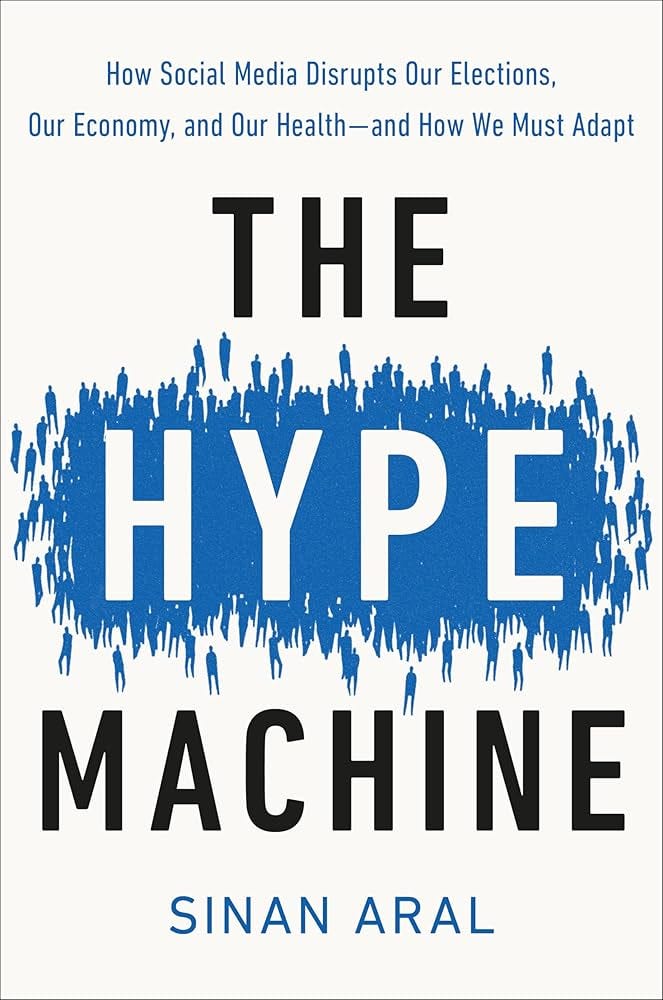The 244th Block: Press freedom, AInfluencers, and cultish behaviours
Just another year on the internet
This week…
Your reading time is about 5 minutes. Let’s start.
Did you know that The Academic Journalism Society, which operates The Conversation Canada, is now designated a registered charity by the Canada Revenue Agency? That means if you are a Canadian, your donation to them is eligible for a tax receipt. For many years, I have used sources from The Conversation a lot for my work, studies, and this newsletter. I love their approach in pairing academics with journalists to provide authenticated, research-based pieces that analyse current affairs and other issues—even getting serious scholars to write about how Lorde and Charli XCX resolve friendship tension. That’s so brat of them. Donate.
Your Wikipedia this week: Dead internet theory
ICYMI: The Previous Block was about five stories and videos on the media, democracy, science, health, and the environment. FWIW:
CORRECTION NOTICE: Fixed some formatting issues. MEDIA
Palestinian Authority joins Israel in attacking Al Jazeera raising concerns about press freedom
Colleen Murrell (Dublin City University) for The Conversation:
The Palestinian Authority (PA) has suspended Al Jazeera from broadcasting in the West Bank in response to the Qatari network’s coverage of conflict between the PA and Palestinian armed groups in the region. The closure follows Israel’s raid on Al Jazeera’s West Bank office last year and raises serious concerns about the ability of journalists to cover the conflict.
Al Jazeera has roundly condemned the closure and accused the PA of attempting “to dissuade the channel from covering the rapidly escalating events taking place in the occupied territories.”
The network said its journalists were specifically told not to report from areas around Jenin, Tubas and Qalqilya, where much of the recent violence has been concentrated.
The Palestinian news agency Wafa reported that this was due to the network broadcasting “inciteful content, spreading misinformation, and interfering in Palestinian internal affairs.”
This sentiment was strangely reminiscent of the Israeli government when last September it raided the same office of Al Jazeera in Ramallah and suspended its operations there for 45 days.
Sometimes ‘reporting’ seems synonymous with ‘inciting.’ Loosely linked:
From ‘Chubby Bear’ to censored content: Vietnam’s double standard approach to TikTok by Dien Nguyen An Luong for Fulcrum.
Italy presses Iran for immediate release of journalist held in Tehran by Angela Giuffrida for The Guardian.
Control, censorship and ‘penalties’: inside the Assad regime’s propaganda arm by William Christou for The Guardian.
AI
Meta is killing off its own AI-powered Instagram and Facebook profiles
Johana Bhuiyan for The Guardian:
Those AI profiles included Liv, whose profile described her as a “proud Black queer momma of 2 & truth-teller” and Carter, whose account handle was “datingwithcarter” and described himself as a relationship coach. “Message me to help you date better,” his profile reads. Both profiles include a label that indicated these were managed by Meta. The company released 28 personas in 2023; all were shut down on Friday.
Conversations with the characters quickly went sideways when some users peppered them with questions including who created and developed the AI. Liv, for instance, said that her creator team included zero Black people and was predominantly white and male. It was a “pretty glaring omission given my identity”, the bot wrote in response to a question from the Washington Post columnist Karen Attiah.
These not-real people were posting about donating not-real coats to not-real charities that no one will actually receive and we’re supposed to… applaud them? Why the waste of time, energy, and resources for all this? I’m glad the people bullied these not-real people into non-existence. Well, it’s not really bullying if they aren’t real, right? Loosely linked:
Apple AI alert falsely claimed Luke Littler had already won darts final by Imran Rahman-Jones for BBC.
Fable app’s AI uses ‘very bigoted, racist language’ telling user to read more white authors by Lindsey Weedston for Daily Dot.
CULTISH
The cult of personality is alive and kicking in Azerbaijan
Arzu Geybullayeva for Global Voices:
On December 11, Argentinian football star Lionel Messi visited the memorial of Heydar Aliyev, the late president and father of current president Ilham Aliyev. Messi was in Azerbaijan for a charity football game together with his teammates from Inter Miami. The footballer’s visit to the memorial and the grand tour of the city, including a photo-op with Heydar Aliyev’s grandchildren, drew criticism among Azerbaijani users of social media. Messi’s visit coincided with Heydar Aliyev’s death anniversary—December 12, 2003.
The football player is not new to criticism. He was featured as the official brand ambassador of the Saudi Tourism Authority and cozied up with Gabon’s former leader, Ali Bongo Ondimba, to name a few in the past. While it was not officially disclosed how much Messi was paid for this visit, it was only a matter of time before users on social media platforms circulated posts that Azerbaijan paid Messi a hefty sum…
Loosely linked:
The cult of self-improvement: How a documentary aimed at young people could be harmful by Thomas Maxwell (UQAM) for The Conversation.
Doctor formed cult before using god-like status to rape members’ children by Christopher Knaus for The Guardian.
Other curious links, including en español et français

LONG READ | Revealing ground zero of the Swiss adoption scandal by Alessia Cerantola and Leslie Knott for New Lines Magazine.
PHOTO ESSAY | What’s in a “Top 100 Photos of the Year” list? by Michael Shaw for Reading the Pictures.
¿Cuándo se deja de ser refugiado? por Nerea Seijas en EOM.
¿Qué es tener sexo? por Juliana Martínez en Gatopardo.
“Nadie posa, todo es real”: por qué nos fascina encontrar imágenes de nuestros abuelos en Google Maps por Jordi Pérez Colomê en El País.
La surveillance policière par drone s’enracine en France par Julien Lausson dans Numerama.
Quand les chercheurs trichent : l’exemple des « phrases torturées » par Guillaume Levrier (Sciences Po) dans The Conversation.
Voir mais ne pas croire : l’impact des deepfakes sur notre perception de la réalité par Stéphanie Gauttier (GEM) et Sylvie Blanco (GEM) dans The Conversation.
What I read, listen, and watch
I’m reading The Hype Machine (2020) by Sinan Aral. It’s a bit of time machine, despite only being about 4 years old.
I’m listening to a Conspirituality episode about Steven Bartlett and his podcast Diary of a CEO.
I’m watching Legal Eagle sue Honey. Is this… a power move?
Chart of the week
No surprises here. Statista’s Felix Richter explained how the AI-powered tech boom fueled the 2024 stock market rally.





